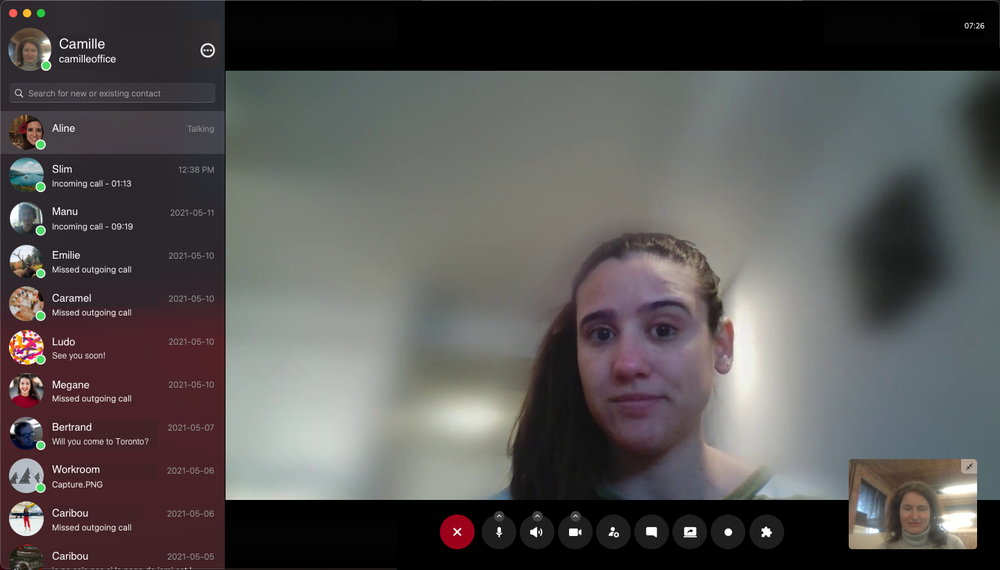Developing an application of the size and complexity of Jami teaches us humility every day. How many times we got excited about a new feature we developed for Jami, only to find out that once out of the metaphorical laboratory where everything worked perfectly, it was a bit of a different experience out in the real world.
Because of the distributed nature of Jami and our ambition to provide Jami on all existing platforms, we usually find out all about the well-functioning or malfunctioning of all the features and their interactions only when the new version is published and battle-tested by our community of users. This sometimes causes frustration to our users, and we apologize to them for this. But we have learned that this is the price to pay when venturing into the development of distributed systems.
Perhaps MALOYA will be an exception to this rule, as we have taken great care in meticulously testing the quality and correctness of the new features introduced in this release.
MALOYA, a musical genre from Reunion Island, heir to the musical practices and rich culture brought by African and Malagasy slaves to the island, but also mixed with other influences from the Indian Ocean, will be the code name of this new version.
So, what are the new features and significant improvements in Jami MALOYA?
Unified and enhanced experience across GNU/Linux and Windows platforms
We are very excited to announce that GNU/Linux users can now enjoy the new unified version for desktops with MALOYA. Based on the Qt framework, both GNU/Linux and Windows PC (and soon macOS too) users will use the same Jami application going forward!
We took the opportunity to enrich and improve the user interface by modifying and simplifying Jami’s various interfaces for simple calls as well as conference management. For example, you can now change your microphones or output devices during a call. Screen sharing has also been improved and simplified!

Conference and Rendezvous point management has also been greatly stabilized and improved: you can configure or delegate conference moderation in a simple and efficient way. The moderator(s) can select the video layout of the conference, give the floor to different participants, or hang up a participant.

Our various tests have shown us that Jami easily supports up to 20 participants with excellent results. We hope to further improve this limit in the coming weeks and Jami should soon support up to 50, or maybe more, users simultaneously.
Jami on GNU/Linux
What will happen to the GTK version of Jami that GNU/Linux users are used to?
We aim to maintain and develop the GTK-based jami-gnome application for a few more months, but we will have to decrease and at some point in the near future stop working on it, as we continue focusing on and further developing the new Qt-based Jami application. However, if developers from the community would like to continue developing the GTK-based application, we would be open to this collaboration.
Amin Bandali (bandali@gnu.org) -- member of the Jami team and responsible for community relations, and GNU maintainer of Jami -- has offered to facilitate this collaboration. Please do not hesitate to contact him if you would like to help develop the GTK version of Jami going into the future!
New plugins and plugin support on macOS
We have continued the development of Jami plugins, and macOS users will now be able to take advantage of them as well, along with Jami users on other platforms.
The "GreenScreen" plugin has been improved and enriched with several useful settings, especially the blurring effect of your background which can be very useful for work meetings or any scenario where you prefer your surrounding to not be visible behind you.

A new "Watermark" plugin is now available! It allows you to embed your logo or any image of your choice in the video stream (either incoming or outgoing). Additionally, you can display the current date and time in your format of choice as well.

There is also the "AudioFilter" plugin for musicians, which allows adding reverb effects to the audio stream.
Jami on iOS and macOS
Although the changes may seem minimal, Apple users will notice a clear improvement in the behavior of the software on mobile devices (iOS).
Firstly, we believe that we have resolved the battery consumption issues on iOS for good. Please try the new Jami version and let us know!
Further, we have redesigned the user interface and simplified it. Jami on iOS should now be much easier to use. In addition to introducing all the improvements and features available on GNU/Linux and Windows, macOS users will discover a more stable and pleasant to use Jami application.

JAMS and a commercial offering for organizations
Last fall, we announced the release of the first version of JAMS (Jami Account Management Server), which enables organizations to associate their employee directories (LDAP or Active Directory) with Jami accounts. We have been working on improving JAMS, and we use it every day at Savoir-faire Linux with great satisfaction! Many JAMS bugs have been resolved, and most importantly, we have improved the ability to push specific configurations to specific devices.
For organizations that would like to have professional support on this component, we now offer a set of affordable services through https://jami.biz that we hope will meet their needs and expectations.
Last but not least
One last point that we think is important to mention:
In recent years, we have focused on peer-to-peer communication and had neglected Jami's ability to work as a SIP phone. This gap is now closed with MALOYA which offers better SIP protocol support, allowing Jami users to use SIP-compatible telephone systems and service providers. This feature brings the ability to place and receive calls with regular phone numbers. Please try out MALOYA’s SIP phone feature, and let us know about your experience! Your feedback will be greatly appreciated and immensely useful in helping us further improve Jami’s SIP phone features.
And the Swarm Chat?
Many of you have been getting impatient...and so have we!!
Those who follow the Jami blog and have read the articles about Swarm Chat are aware of the complexity of the process. And, it is true, the MALOYA version does not provide this feature yet. Swarm chat is a very delicate feature and we want to make sure that its introduction does not break the conversation history of our users, and that it is compatible with older Jami versions that do not support Swarm Chat.
But don't despair! Here is our plan for Swarm Chat in a nutshell:
In a few weeks, before July, we will release the first building block for Swarms, a beta version that will allow the synchronization of new conversations between different devices of the same account.
In the second phase, likely towards the end of the summer, we will provide a full version of Swarm Chat. We are quite confident with this schedule.
Support for Jami users
To conclude, a word about Jami's support. Let's face it, we get a lot of emails from users asking questions, making suggestions, or reporting bugs. With the team being incredibly busy working passionately on the development of Jami across platforms, we are not always quick to reply to the questions. We apologize for that but would like to offer some tips that may be useful if you need help.
Firstly, we put at the disposal of the community a forum open to all and in several languages where you can get help from other Jami users, and some Jami developers, potentially in your native language, at https://forum.jami.net.
A very important tip to remember, is that no matter what kind of problem you face with Jami, it is very crucial to indicate the Jami version and the operating system you are using Jami on.
If you are a Jami enthusiast, an advanced user, or a developer, you can directly report issues to the Jami team via our GitLab, at https://git.jami.net.
That's all for now! We wish you the best experience with MALOYA, the new version of Jami, and as always, we look forward to hearing your valuable feedback about Jami!
Postscript: about Jami packages in GNU/Linux distributions
A quick word about the GNU/Linux versions of Jami: many GNU/Linux distributions now include Jami by default in their repositories. This is a form of recognition that we are of course happy about. However, some of these distributions can often be very late to update Jami, and Jami being a very fast-evolving software, can easily become outdated in those distributions. As such, we invite Jami users to use the packages we build and distribute on our website for many distributions, which are always up-to-date and available at https://jami.net/download/.
We also invite GNU/Linux distribution maintainers who wish to package Jami in their distribution’s repositories to contact us. We would be happy to try and help you package Jami for your distro!








